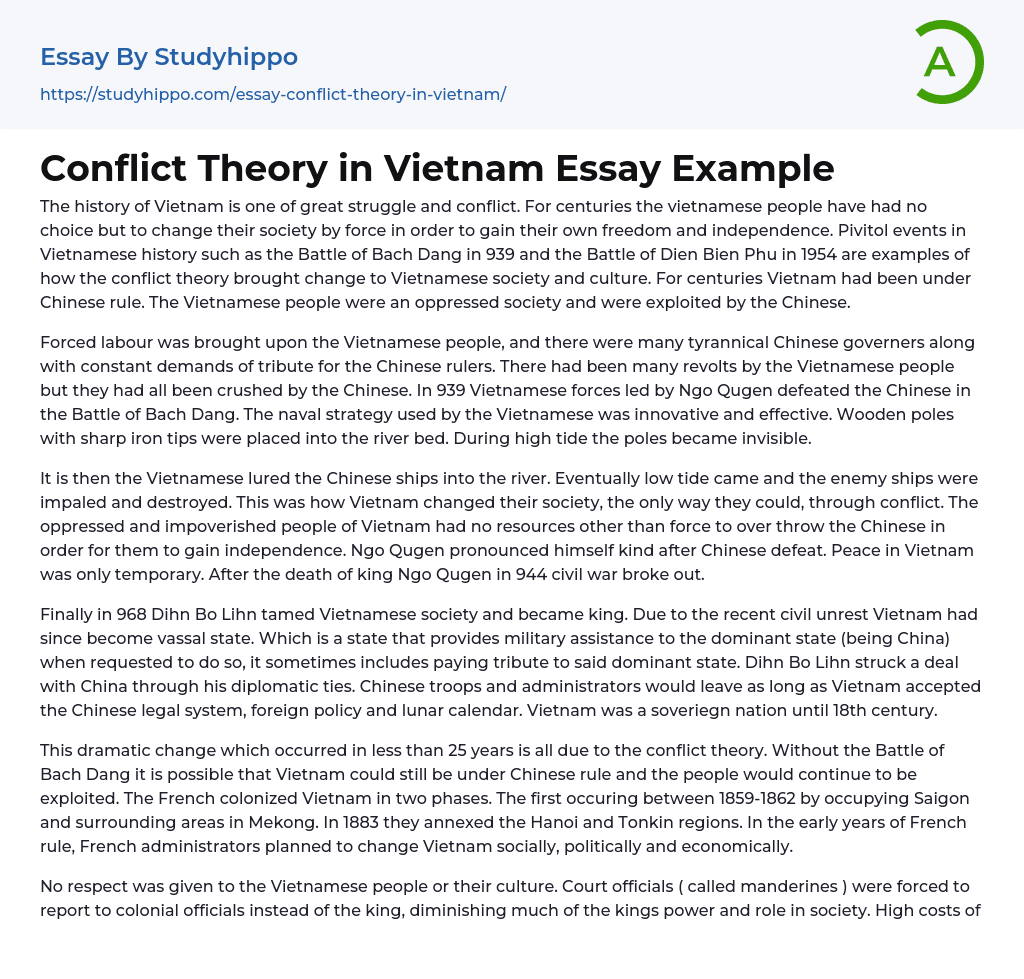The history of Vietnam has been characterized by a strong struggle and conflict. The Vietnamese people have had to forcibly transform their society in order to achieve their freedom and independence. Notable events such as the Battle of Bach Dang in 939 and the Battle of Dien Bien Phu in 1954 demonstrate how conflict theory influenced the evolution of Vietnamese society and culture. For centuries, Vietnam was under Chinese rule, which led to the oppression and exploitation of its people.
The Vietnamese people were subjected to forced labour and oppressive Chinese rulers who constantly demanded tribute. Despite numerous revolts, the Vietnamese uprisings were all suppressed by the Chinese. However, in the Battle of Bach Dang in 939, Vietnamese forces led by Ngo Qugen emerged victorious and defeated the Chinese. The Vietnamese employed an inventive and succes
...sful naval strategy, which involved placing wooden poles with sharp iron tips into the river bed. These poles became invisible during high tide.
The Vietnamese lured the Chinese ships into the river, impaling and destroying them when low tide eventually came. This act of conflict was Vietnam's only means of changing their society and gaining independence, as the oppressed and impoverished people had no resources other than force. After the Chinese defeat, Ngo Qugen declared himself king, bringing temporary peace to Vietnam. However, civil war broke out in 944 following Ngo Qugen's death.
In 968, Dihn Bo Lihn assumed the throne of Vietnam and successfully pacified his nation. Due to recent internal strife, Vietnam had become subservient to China, offering military support and occasionally paying tribute. However, Dinh Bo Lihn struck a bargain with Chin
by leveraging his diplomatic ties. In return for the withdrawal of Chinese troops and administrators from Vietnam, the country had to adopt China's legal system, foreign policy, and lunar calendar. Despite this agreement, Vietnam retained its status as an independent state until the 18th century.
The conflict theory caused a significant transformation within less than 25 years. If it weren't for the Battle of Bach Dang, Vietnam might still be under Chinese control and its people would continue to face exploitation. The French colonized Vietnam in two stages. The first stage occurred from 1859-1862 when Saigon and surrounding areas in Mekong were occupied. In 1883, the Hanoi and Tonkin regions were also taken over. During the early years of French colonization, their administrators had intentions to bring about social, political, and economic changes in Vietnam.
During French colonial rule in Vietnam, the Vietnamese people and their culture faced disrespect. The king's power and role in society were diminished as court officials, known as mandarins, had to report to colonial officials instead of the king. Moreover, high taxes on salt, opium, alcohol, and land were imposed due to the expensive colonial administrators. This led to forced labor being reintroduced under French rule, further oppressing the Vietnamese people and their culture. Consequently, half of the Vietnamese population became landless by 1940, resulting in impoverishment and oppression. These examples illustrate the devastating effects of French colonial rule in Vietnam.
Despite multiple uprisings, protests, and guerrilla groups trying to overthrow the French, none of these attempts were successful as the French military suppressed all such endeavors. In the early 20th Century, several other national groups emerged
with a goal to achieve independence for Vietnam and establish its own constitution. However, these appeals were ignored. It was only when Ho Chi Minh founded the Indo-Chinese Communist Party and the League for the Independence of Vietnamese (Vietminh) that the French started recognizing a concrete challenge to their dominance over Vietnam.
During World War II, France had to agree to Japan's occupation of Vietnam. However, with the support of the American military, the Vietminh managed to remove Japan from Vietnam. As a result, the Vietminh took control of South Vietnam while the French attempted to regain their power in the North. This resulted in a war between the two factions that lasted from 1946 to 1954. Ultimately, the Vietnamese emerged triumphant over the French in the Battle of Dien Bien Phu, leading to Vietnam being declared an independent nation, no longer under colonial rule.
The conflict theory, exemplified in Vietnamese history, demonstrates that significant societal transformation can occur. By employing aggression and harnessing people power, the conflict theory has played a crucial role in facilitating substantial change within society. Without this approach, Vietnam and other societies would have remained stagnant under colonial rule, perpetuating oppression and exploitation.
- Air Force essays
- Army essays
- Soldiers essays
- Army Values essays
- United States Army essays
- Veteran essays
- Aircraft essays
- Sergeant essays
- Absolutism essays
- Appeal essays
- Bourgeoisie essays
- Contras essays
- Corporate Governance essays
- Corruption essays
- Democracy essays
- Democratic Party essays
- Developed Country essays
- Dictatorship essays
- Elections essays
- European Union essays
- Federalism essays
- Foreign essays
- Foreign policy essays
- Gentrification essays
- Hillary Clinton essays
- Income Tax essays
- International Relations essays
- John Marshall essays
- John Stuart Mill essays
- Left-Wing Politics essays
- Liberty essays
- Military essays
- Monarch essays
- Monarchy essays
- Political Corruption essays
- Political Party essays
- Political Science essays
- President Of The United States essays
- Public Service essays
- Red Cross essays
- Reform essays
- Republic essays
- Revenge essays
- Social Security essays
- Sovereign State essays
- State essays
- Supply essays
- Terrorism essays
- United Nations essays
- World Trade Organization essays




